5 Gut-Healthy Foods a Gastroenterologist Eats Every Day

The gut is one of the most important organs in our body. Not only is it responsible for breaking down the foods we eat, but it absorbs the nutrients our bodies need to function daily—while also kicking out toxins and other harmful bacteria. It’s a ceaseless job, but consuming the right foods can make a huge impact on how your gut flora affects your overall health, mood, metabolism, and more.
“The more diverse your microbiome, the healthier your gut,” internal medicine physician William W. Li, MD, told Eating Well. “This translates into lower inflammation and a reduced risk for chronic diseases like heart disease and type 2 diabetes. It can also promote faster healing, a more streamlined metabolism and even better mood.”
The good news is that gut-healthy foods are packed with both nutrients and flavor. Keep reading to see what one gastroenterologist eats every day to keep his gut in check.
RELATED: 7 Best Supplements for Gut Health, According to Doctors.
1
Sourdough Bread
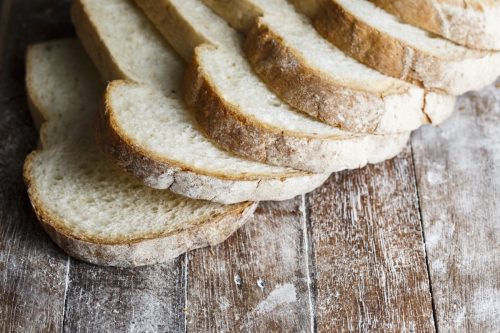
When he isn’t treating patients, gastroenterologist Joseph Salhab, DO, is baking his own sourdough. “For my gut-friendly breads, I love sourdough,” Salhab told all 1.5 million of his followers in a recent TikTok clip.
According to Salhab, sourdough is “lower in gluten and other bloat-causing agents than other breads.”
That’s because the fermentation process helps break those agents down, consequently leading to a spike in prebiotic and probiotic properties, according to a 2021 report published in the journal Microorganisms.
2
Kefir Cheese or Greek Yogurt
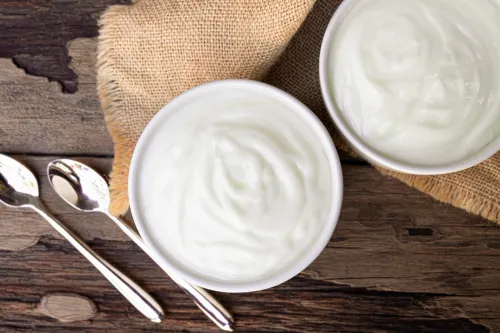
If he’s toasting a slice of sourdough, Salhab likes to add a thin layer of spreadable kefir cheese because it’s “naturally rich in probiotics.”
Kefir is a fermented, milk-like beverage made from kefir grains, according to a study about its biological activities published in the journal Foods. “This beverage consumption is associated with a wide array of nutraceutical benefits, including anti-inflammatory, anti-oxidative, anti-cancer, anti-microbial, anti-diabetic, anti-hypertensive, and anti-hypercholesterolemic effects,” the researchers wrote.
For example, the kefir farmer’s cheese from the brand Lifeway is 99 percent lactose-free and high in calcium and protein. But most importantly, it contains 12 types of live and active probiotics.
If sourdough toast isn’t on the menu, Salhab will start his morning with Greek yogurt, another food naturally high in probiotics. For a garnish, he adds blueberries and raspberries “because they help my gut bacteria thrive and they help with memory and focus.” To prevent constipation, Salhab sprinkles chia seeds and sometimes adds a dash of cinnamon to fight off inflammation.
RELATED: 4 Best Fruits to Erase Bloating, Science Shows.
3
Avocados
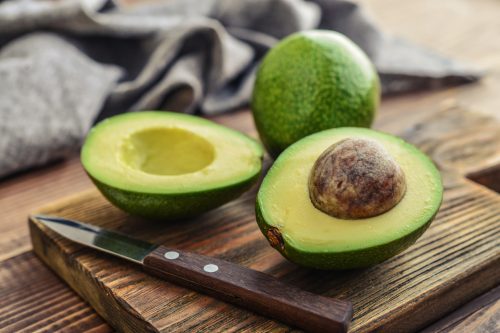
Salhab is also a big fan of avocados, which he describes as a “great fat source.” One of his favorite breakfast foods is avocado toast, which he makes with his homemade sourdough bread.
A known superfood, avocados are high in fiber and packed with essential nutrients, including potassium, “which helps promote healthy digestive function,” explains Johns Hopkins Medicine. Avocados can also make you feel less gassy because they’re considered a low-fructose food.
4
Tomatoes
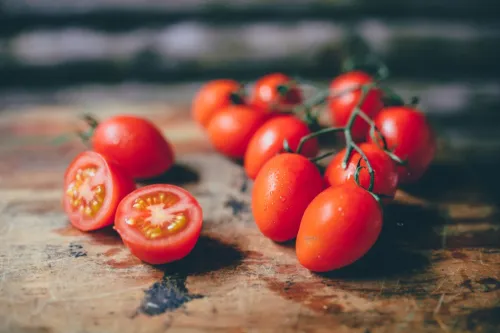
After spreading a thick layer of smashed avocado, Salhab likes to add chunks of sliced tomatoes as a “great prebiotic.”
As Best Life previously explained, “Prebiotics differ from probiotics in that they stay in the gut and serve as food for your gut’s microflora.”
Tomatoes can also help lower your risk of heart disease, reduce cholesterol and cancer risks, and boost immunity, according to the Cleveland Clinic.
5
Extra Virgin Olive Oil
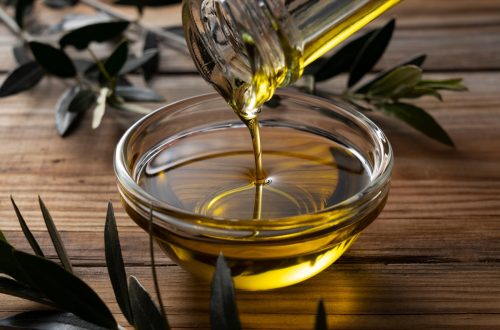
As a finishing touch, Sahab drizzles extra virgin olive oil on his sourdough toast “for brain and gut health.”
“Olive oil modifies how your gut microbiome communicates with your brain,” explains Psychology Today. “Olive oil’s beneficial effects on the human brain and body are likely related to the presence of the polyphenols hydroxytyrosol (HT) and Oleic acid (OA). HT protects cells that are under oxidative stress. OA is a monounsaturated omega-9 fatty acid that is generally higher in olive oil than vegetable fats.”